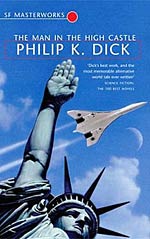
![]() Triseult
Triseult
3/24/2012
![]()
There's a saying about genre fiction: a genre is one good book followed by a legion of imitators. If that's true, then The Man in the High Castle is the book of alternate history, followed by imitators of lesser talent.
This is not the most well-known Philip K. Dick novel, but it's one of the most highly-regarded. When Dick came up with the concept of a USA conquered by Japan and Germany during World War Two, it was one of his original, outlandish concepts. This is the real thing, the father of the alternate history genre since then augmented by some talented authors (Kim Stanley Robinson's The Years of Rice and Salt) and some less talented individuals (Harry Turtledove).
All that being said, The Man in the High Castle is a typical K. Dick novel: meaning, you'll love or hate this book as much as you love or hate other works by Dick. It's filled with many common themes dear to the author: confused identity, split personalities, deception, and deep questions on the nature of Reality. One absolutely striking example of this is Dick's concept that in a world where Nazis have won the War, Jews still exist, but have gone deep underground. One of Dick's characters is a favored member of the Nazi party, yet is secretly a Jew who has received plastic surgery and altered his history, all to corrupt the Nazi party from within.
Also fascinating about this novel is how Dick avoids the obvious conclusions from World War Two. The Nazis are depicted as madmen, yes, having carried the Final Solution to Africa where they laid waste to the African continent. However, the people inhabiting this world have lived for 15 years with Nazis in power, and tend to take them as an unavoidable though unpleasant fact of life. Likewise, the Japanese, although occupying America, are depicted as anything but simple bad guys.
The most powerful concept at the heart of The Man in the High Castle, however, is the depiction of occupied America. Having been defeated 15 years earlier, the US is no longer a powerful culture, but an inoffensive yet quaint colony. Japanese businessmen collect artifacts of American history like mere curiosities, obsessed with the past of a culture on the verge of dying. This depiction, coupled with the placid acceptance of it by American characters, is an unexpected yet truly effective idea.
The story is disjointed and tends to wander, and the ending has been termed weak by many readers; but even with these faults, The Man in the High Castle remains a mesmerising work from one of SF's most important authors, and even today it dwarfs the other novels in the genre it has birthed. Highly recommended.